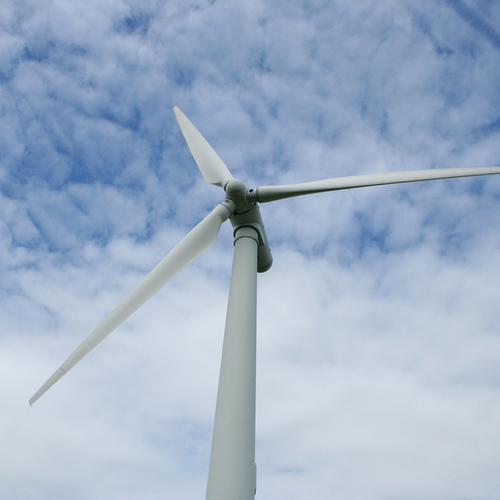
A study of more than 1,200 adults in two Canadian provinces has found no definitive connection between the noise from utility-scale wind turbines and a number of chronic health problems, according to published reports.
The study by Health Canada and Statistics Canada focused on people living in Ontario and Prince Edward Island in the vicinity of turbine installations. The study was launched in 2012 after groups fighting the development of wind farms said turbines were making people ill, said an article posted at the website of The Toronto Star.
On November 6, results of the $2.1 million study were released. While the panel said that turbines could be annoying for a number of reasons — including the noise made by the turning rotor blades, the aircraft warning lights on top of the turbines, and the way the moving blades cause shadows to flicker — there were no definitive connections to poor health and disease.
Still, the report says the findings are not conclusive.
No links to self-reported or measured health issues
Researchers selected all homes within 600 meters of one of the 399 turbines included in the study, plus a random selection of houses between 600 meters and 10 kilometers from the turbines. One adult from each of 1,293 participating households took part, answering questions in person and submitting to tests of blood pressure, sleep quality, and hair cortisol (a biomarker for stress).
Houses were grouped into different categories of wind turbine noise, ranging from less than 25 decibels (dB) to more than 40 dB.
When it came to results of self-reported health problems, the study found no connection between wind turbine noise and sleep disturbance, health issues such as dizziness, migraine headaches or tinnitus, chronic problems like heart disease, diabetes or high blood pressure, or high stress. Results of measured tests were the same.
But the more turbine noise, the more people became annoyed, the report says, and annoyance is not a trivial problem.
“Statistically significant exposure-response relationships were found between increasing WTN [wind turbine noise] levels and the prevalence of reporting high annoyance,” the report says. “These associations were found with annoyance due to noise, vibrations, blinking lights, shadow and visual impacts from wind turbines. In all cases, annoyance increased with increasing exposure to WTN levels.”
While researchers found the closer and louder the turbines, the more likely people were to be annoyed, if study subjects were personally benefiting from the turbines — getting rent, for example — the annoyance levels were “significantly lower.”
The study notes that annoyance is “statistically related” to several self-reported health problems, such as high blood pressure, migraines, and dizziness, and can be linked to measured hair cortisol and blood pressure.
“Although Health Canada has no way of knowing whether these conditions may have either pre-dated, and/or are possibly exacerbated by, exposure to wind turbines, the findings support a potential link between long term high annoyance and health,” the report says. “Findings suggest that health and well-being effects may be partially related to activities that influence community annoyance, over and above exposure to wind turbines.”
Wind opponents also claim victory
While wind opponents didn’t get the smoking gun they were looking for, they also found something to like in the report. According to The Star, Eric Gillespie, a Toronto lawyer representing wind farm opponents, said the report was a “breakthrough.”
“It confirms what appear to be serious adverse health effects,” he told the newspaper. “It’s coming from the national health regulator.”
Gillespie is currently representing a town on Lake Huron that is opposing two wind farms before an environmental review panel. He said the Health Canada study would be a boost to his clients.
““It would be very difficult to argue that effects on blood pressure, migraines, ringing of the ears, dizziness, sleep and stress issues — that one or more of (these) is not a serious health impact,” The Star quotes Gillespie as saying. “This study finds that those are statistically significantly related to wind turbine noise and annoyance.”
The Canadian Wind Energy Association looked at the results through opposite end of the telescope.
Noting the study found “no evidence of a causal relationship” between turbine noise and medical issues, association president Robert Hornung said in a press release: “The balance of scientific evidence to date continues to show that properly sited wind turbines are not harmful to human health and that wind energy remains one of the safest and environmentally friendly forms of electricity generation.”
Results are of potential interest elsewhere
As the number of wind farms goes up, so do complaints from nearby residents. Some residents report leaving their homes because of turbine-induced problems, and a number of lawsuits have been filed by opponents.
Neither the Centers for Disease Control and Prevention nor the World Health Organization recognizes wind turbines as a documented source of health problems.
A county health board in Wisconsin last month declared a small wind farm near Green Bay a public health risk. County officials told a local newspaper recent studies made a connection between low-frequency turbine noise and poor health.
But the specifics of the studies weren’t shared, and county officials have not returned calls asking for more details.
Separately, the Wisconsin Wind Siting Council in October sent a report to state legislators summarizing recent scientific findings on health implications of turbines. The council didn’t conduct any research itself, but looked at what others had found between 2011 and 2014.
The panel concluded some people living near turbines “may experience annoyance and a small fraction report sleep disturbance” due to turbine noise. Some people also report increased stress, the council said, and stress and sleep disturbance may be related to chronic health conditions.
The council also found people who have negative feelings about wind energy are more likely to report health problems. A majority of people living near turbines “do not report stress, sleep deprivation, or chronic adverse health effects attitude to wind turbines,” the council wrote.
The council recommended no changes in current state law.
Weekly Newsletter
Get building science and energy efficiency advice, plus special offers, in your inbox.















0 Comments
Log in or create an account to post a comment.
Sign up Log in